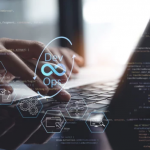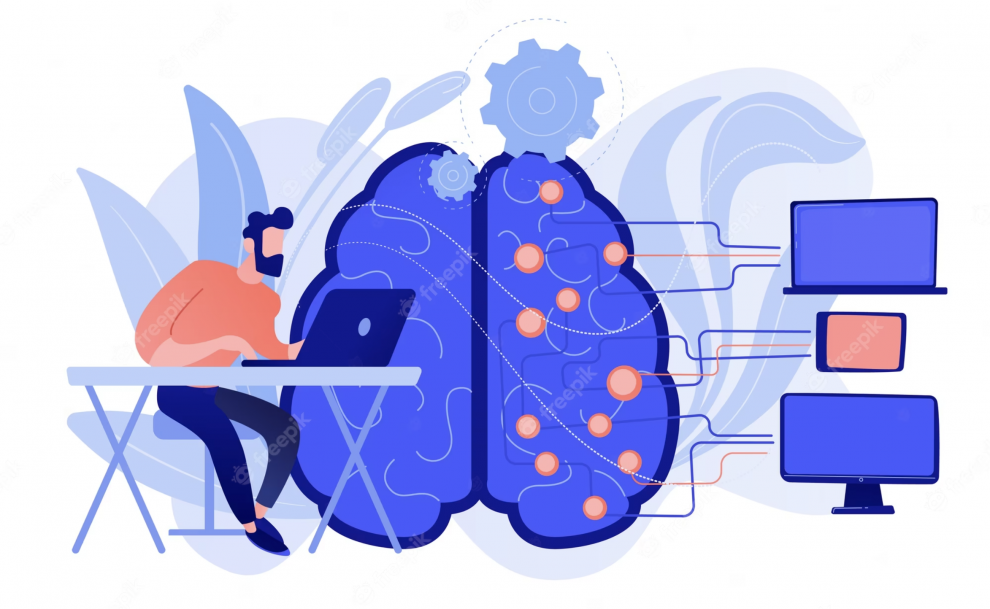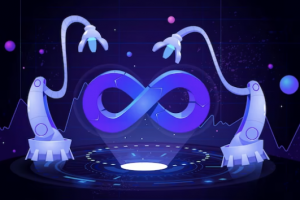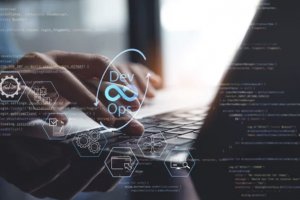In the realm of modern software development, DevOps transformation has emerged as a pivotal strategy for enhancing efficiency, collaboration, and overall delivery processes. This paradigm shift aims to bridge the gap between development and operations teams, ensuring seamless integration and rapid deployment of software solutions. At the heart of this evolution lies the burgeoning influence of Machine Learning (ML) and Artificial Intelligence (AI), revolutionizing the way DevOps operates.
Machine Learning and Artificial Intelligence have emerged as catalysts propelling the evolution of DevOps practices. ML algorithms analyse historical data to predict bottlenecks, resource constraints, and potential failures in deployment pipelines. Meanwhile, AI technologies empower DevOps teams to proactively manage incidents and foresee potential issues, reducing downtime and enhancing system reliability.
Integrating AI and ML into DevOps: A Statistical Overview
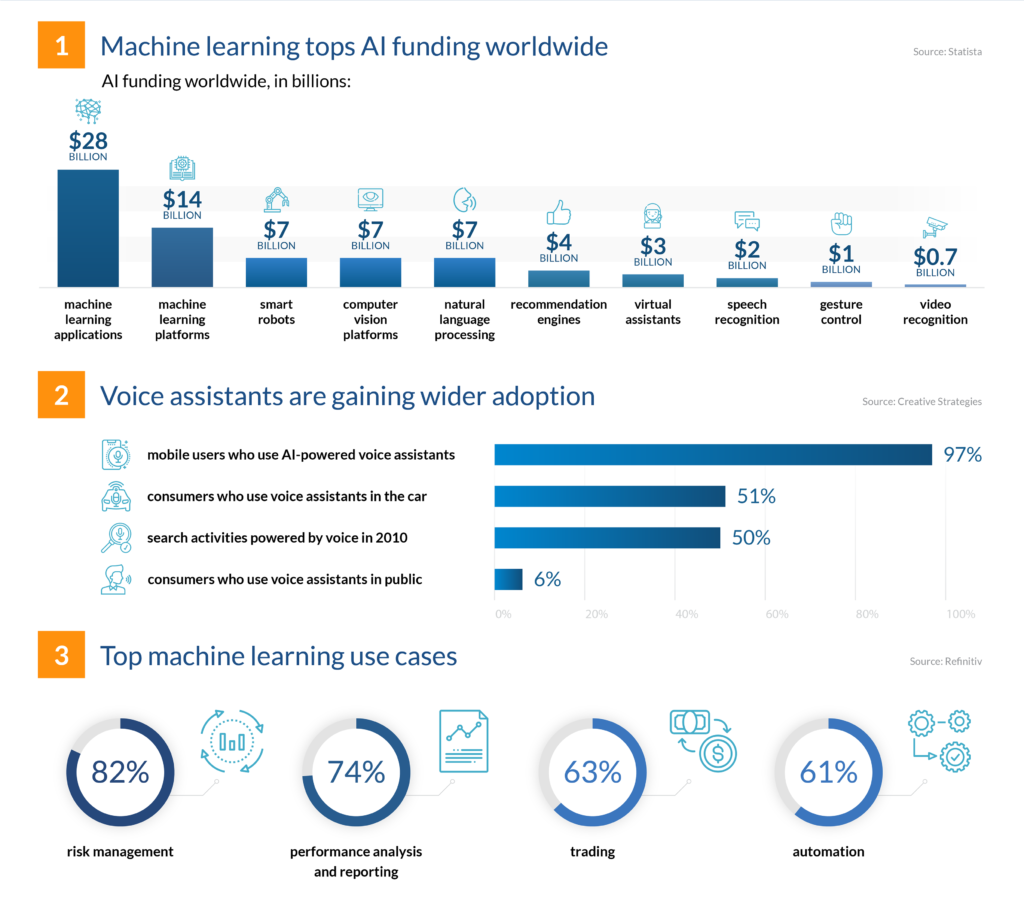
Source: Statista
The Confluence of ML, AI, and DevOps

At the core of this confluence lies Machine Learning (ML), a branch of AI that empowers systems to learn and improve from experience without being explicitly programmed. In the context of DevOps, ML brings automation and predictive capabilities to the forefront.
Exploring Machine Learning (ML) in DevOps
At the core of this confluence lies Machine Learning (ML), a branch of AI that empowers systems to learn and improve from experience without being explicitly programmed. In the context of DevOps, ML brings automation and predictive capabilities to the forefront.Automating Deployment and Infrastructure Management
ML algorithms are harnessed to automate deployment processes, making them more adaptive and efficient. These algorithms learn from historical deployment data, enabling them to optimize resource allocation, handle scaling dynamically, and even predict potential issues before they occur.Predictive Analytics for Performance Optimization
ML-driven predictive analytics have revolutionized how DevOps teams manage application performance. By analyzing vast datasets, ML algorithms can forecast performance bottlenecks, allowing teams to proactively address issues, fine-tune resource allocation, and enhance overall system reliability.Role of Artificial Intelligence (AI) in DevOps
Complementing ML, Artificial Intelligence (AI) adds a layer of cognitive and decision-making capabilities to DevOps practices. It empowers systems to understand, reason, and take appropriate actions, making operations smarter and more efficient.Intelligent Incident Management and Resolution
AI-driven incident management systems leverage natural language processing and historical incident data to intelligently categorize, prioritize, and even suggest solutions for issues as they arise. This results in faster incident resolution, reduced downtime, and improved customer experience.Cognitive Automation in DevOps Processes
AI-powered cognitive automation goes beyond predefined rules. It enables systems to adapt to evolving scenarios by learning from new data and patterns. This is particularly valuable in DevOps, where processes are dynamic and require continuous optimization.
The confluence of ML, AI, and DevOps is more than just a technological evolution; it’s a paradigm shift that’s driving unparalleled efficiency, scalability, and innovation. By embracing these technologies, DevOps practitioners in the USA and beyond can accelerate software delivery, enhance quality, and unlock new dimensions of operational excellence. In the following sections, we’ll delve into the tangible impact of ML and AI on DevOps transformation, exploring real-world use cases and practical implementation strategies that empower enterprises to thrive in the digital age.
Use Cases of Machine Learning (ML) and Artificial Intelligence (AI) in DevOps

The integration of Machine Learning (ML) and Artificial Intelligence (AI) into DevOps practices has given rise to a multitude of innovative use cases that are revolutionizing how software development and operations intersect. These technologies are not only optimizing existing processes but also enabling entirely new approaches to managing and delivering software.
Application Performance Monitoring and Optimization
- Real-time Monitoring Using ML Algorithms
ML algorithms analyze real-time data from various sources, such as logs, metrics, and user interactions, to detect anomalies and patterns that might indicate performance issues. This proactive monitoring helps DevOps teams identify and address potential problems before they impact users. - Capacity Planning and Scaling with AI Insights
AI-driven insights analyze historical usage patterns to predict future resource requirements. This empowers DevOps teams to plan for optimal resource allocation and scaling strategies, ensuring seamless performance even during peak usage periods.
Anomaly Detection and Security
- ML-Driven Intrusion Detection and Prevention
ML algorithms scrutinize network and system behavior to identify deviations from normal patterns. This proactive approach to security enables early detection of potential threats, such as unauthorized access or malicious activities, allowing DevOps teams to respond swiftly. - AI-Analytics for Identifying Deviation from Secure Patterns
AI-driven analytics enhance security by identifying deviations from established secure patterns. This can include unusual user behavior, unexpected data flows, or unauthorized system changes. By leveraging AI’s pattern recognition capabilities, DevOps teams can mitigate security risks more effectively.
Automated Testing and Quality Assurance
- ML-Driven Automated Testing and QA
ML algorithms analyze historical testing data to optimize testing strategies. They can prioritize test cases based on the likelihood of failure, reducing testing time while increasing coverage and accuracy. - AI-Powered Bug Detection and Prevention
AI systems can analyze code repositories, identifying potential coding errors, vulnerabilities, and bugs. This proactive bug detection aids developers in addressing issues early in the development cycle, leading to more robust and secure software.
Release Management and Continuous Deployment
- Smart Release Management with AI
AI-powered release management systems can assess the impact of code changes and suggest optimal release strategies. This minimizes the risk of unexpected issues during deployment. - Automated CI/CD Pipelines with ML
ML algorithms automate the analysis of code changes and historical performance data to determine the feasibility of automatic deployments. This leads to smoother CI/CD pipelines and faster release cycles.
The integration of ML and AI into DevOps processes is unlocking unprecedented levels of efficiency, reliability, and innovation. By harnessing the power of these technologies, DevOps teams in the USA and beyond are able to streamline operations, enhance security, and deliver high-quality software at an accelerated pace. As we move forward, the potential for even more advanced use cases continues to expand, reshaping the landscape of DevOps transformation.
Also Read: How to Stay Up-to-Date on the Latest DevOps Trends in the USA
Considerations for USA-based Enterprises in Implementing ML and AI in DevOps Transformation

As Machine Learning (ML) and Artificial Intelligence (AI) become integral to the DevOps landscape, USA-based enterprises embarking on this transformative journey must navigate specific considerations to ensure successful integration and harness the full potential of these technologies.
1. Regulatory and Compliance Factors
USA enterprises operate within a complex regulatory environment that spans various industries, from finance to healthcare. When integrating ML and AI into DevOps, it’s essential to consider how these technologies impact compliance with regulations such as HIPAA, GDPR, and industry-specific standards. Ensuring that data privacy and security are upheld in the context of ML and AI operations is crucial to avoid legal repercussions.
2. Data Privacy and Security Concerns
The sensitive nature of data handled by USA enterprises requires a robust approach to data privacy and security. ML and AI models often require access to substantial datasets for training, which can include personally identifiable information (PII). Implementing encryption, access controls, and anonymization techniques are paramount to safeguarding sensitive data throughout the ML and AI lifecycle.
3. Cloud Infrastructure Selection and Management
USA-based enterprises often rely on cloud infrastructure for its scalability and flexibility. When incorporating ML and AI into DevOps, choosing the right cloud provider and architecture is crucial. Consider factors like data residency, latency, and integration capabilities when deploying ML and AI models in the cloud. Additionally, monitoring and managing costs associated with cloud resources is essential to avoid unexpected expenses.
4. Talent and Skill Development
ML and AI expertise are in high demand, leading to skill shortages in the industry. USA enterprises must invest in training their DevOps teams to acquire the necessary skills to implement and manage ML and AI technologies effectively. This could involve upskilling existing team members, hiring specialized talent, or partnering with external experts.
5. Change Management and Cultural Shifts
Integrating ML and AI into DevOps requires a cultural shift within the organization. USA enterprises need to foster a culture of innovation, collaboration, and continuous learning. DevOps teams must be open to embracing new technologies and adapting their workflows to accommodate ML and AI practices.
6. Ethical and Bias Considerations
ML and AI models are not immune to biases present in training data. Enterprises must be vigilant in identifying and mitigating biases that could lead to unfair or discriminatory outcomes. USA-based enterprises should follow ethical guidelines and consider diverse perspectives to ensure that ML and AI technologies are deployed responsibly.
7. Return on Investment (ROI) Assessment
Implementing ML and AI in DevOps requires significant investments in terms of resources, time, and technology adoption. USA enterprises must conduct thorough ROI assessments to determine the tangible benefits these technologies bring to software development and operations. Whether it’s increased efficiency, faster time-to-market, or improved customer satisfaction, quantifying the ROI is essential for informed decision-making.
As USA-based enterprises navigate these considerations, they can position themselves to leverage the transformative capabilities of ML and AI in their DevOps transformation. By addressing regulatory, security, talent, and ethical concerns, these enterprises can embrace innovation while ensuring a secure and compliant journey into the future of software development and operations.
Also read: Top DevOps service companies in San Francisco, USA
Conclusion
In the dynamic landscape of software development and operations, the fusion of Machine Learning (ML) and Artificial Intelligence (AI) with DevOps practices has ushered in a new era of efficiency, innovation, and transformative potential. This guide has delved into the intricate relationship between DevOps transformation and the power of ML and AI, illuminating the path for USA-based enterprises to navigate this evolving terrain.From understanding the fundamental importance of DevOps transformation to recognizing the growing significance of ML and AI, we’ve explored how these technologies intersect to reshape the way software is developed, deployed, and maintained. The synergy between these fields not only accelerates delivery but also elevates the quality and reliability of software solutions.
We’ve unveiled the remarkable use cases of ML and AI within DevOps, from real-time performance optimization and anomaly detection to automated testing and AI-driven incident management. These applications demonstrate the tangible impact that ML and AI bring to the table, driving smarter decision-making, proactive issue resolution, and enhanced security.






